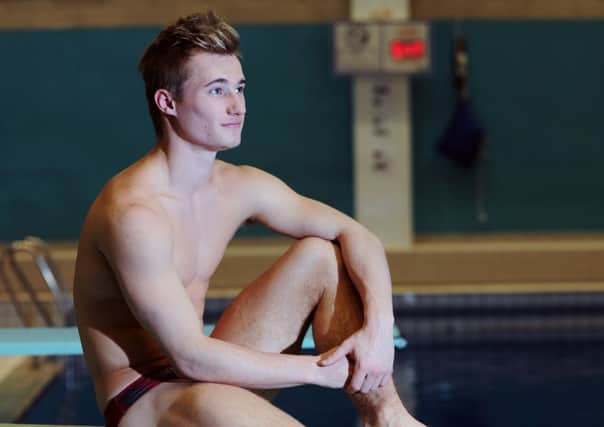Interview: Why Laugher smiled in the face of danger


The 18-year-old from Harrogate was flying home from China where he had just won a World Cup bronze medal when the plane he was in started haemorrhaging fuel.
“We were looking at the flight times on the monitors and it said eight hours remaining – then all of a sudden it said an hour,” recalls Laugher, who was sat between his 3m syncho partner Chris Mears and fellow British divers Tonia Couch and Sarah Barrow.
Advertisement
Hide AdAdvertisement
Hide Ad“Ten minutes later the alarms started going off and we were like ‘What’s happening here?’


“I looked out of the window and they were pouring fuel out of the plane.
“We didn’t know it was fuel at the time, it was just a huge plume of white smoke.
“People in smoke masks then emerged and started heading down into the hold below which was directly in front of us.
Advertisement
Hide AdAdvertisement
Hide Ad“Tonia was balling her eyes out. Some of the stewardesses were crying. We could see huge trees out of the window and the stewardesses were saying if we could get over them there was a big lake we could land on.
“But the pilots managed to find a military base that was used for landing bi-planes. Landing a 747 is a little more difficult on a runway used for bi-planes, but they were very successful and they handled it really well.
“It was a fire in the cabin, just the bit where the crew sleep, apparently. We were never officially told.
“It was scary but we were pretty certain we were in the best hands. Me and Chris were laughing about it. If you’re going to die then you may as well laugh about it.”
Advertisement
Hide AdAdvertisement
Hide AdLaugher’s ‘humour’ was tested even further when it took four days for him and the 200-odd passengers to get another flight out of Siberia, the dictionary definition of ‘no man’s land’, in which they found themselves.
By the time he finally arrived back home in Leeds, the teenager barely had time to unpack and relay the story to relieved and horrified family members before he was packing his trunks again and heading to Glasgow.
Within seven days, Laugher had won two gold medals and a silver at the Commonwealth Games.
“It was a very stressful time,” he says. “It’s funny now, but very scary at the time.
Advertisement
Hide AdAdvertisement
Hide Ad“I’m safe now and that’s all that matters. Hopefully there’s no more episodes like that – because I can’t afford to be scared of flying.”
Such a traumatic experience in an aeroplane would be enough to frighten the life out of even the most stoic of individuals, but even allowing for his relatively tender years, Laugher has proven adept at turning adversity into a positive.
Two and a half years ago, the then-16-year-old slipped off the board and fell into the water in front of 17,000 people in the premliminary round of the Olympic 3m springboard competition at London 2012.
It was a devastating end to what could have been a career highlight, and one that might have shattered the burgeoning careers of less resolute teenagers.
Advertisement
Hide AdAdvertisement
Hide AdBut Laugher bounced back immediately, winning two gold medals at the junior world championships.
“I had one chat with a sports psychologist because they were worried about how I would take it,” he says of his London fall.
“I didn’t need any help because a few weeks later I became a four-time world junior champion.
“The way I look at it is if I kept looking back on it and getting upset about it I’d have never moved on.
Advertisement
Hide AdAdvertisement
Hide Ad“The aim after London was to take everything that went wrong that day and ensure it never happens again; making sure my planning was more tailored to development and so on.
“Things like that are going to happen. It’s a shame it happened on the biggest stage and it might happen to me again. But every time something goes bad I can’t get upset about it.
“It’s about using the negatives to progress, that’s what I’m trying constantly to do.”
The City of Leeds star – one of six medallists the John Charles club celebrated in Glasgow – certainly did that in 2014.
Advertisement
Hide AdAdvertisement
Hide AdThrough the six-event world series calendar in the Spring, Laugher progressively got better until his crowning moment in Shanghai when, against an elite field – the kind he hopes to face in Rio next summer – he won a bronze medal.
Two weeks later – with the crash-landing episode fresh in his mind – Laugher announced himself as a big name in British diving with golds in the 1m springboard and 3m synchro, and a silver in the 3m individual event.
“It was a great year and exceeded all my expectations,” adds Laugher, who finished 2014 ranked second in the world.
“The bronze in Shanghai was the big one. The Commonwealth Games is a huge event and is televised, so getting those medals makes you feel amazing and gets your name out there more than a World Cup bronze. But the World Cup was the main target because of the standard of the field.
Advertisement
Hide AdAdvertisement
Hide Ad“The Commonwealth Games was more of a mental challenge, competing day after day and all that had gone before; the World Cup, the crash landing.
“Hopefully this year will be a little less hectic.”
It should be, with just seven international events culiminating in the world championships in Kazan in late July.
If 2014 taught Laugher anything, it is to keep pushing himself.
“There’s no point holding back,” says Laugher, who only finished his education last summer.
Advertisement
Hide AdAdvertisement
Hide Ad“The way me and my coach see it now is if I do an easy set of dives I can finish eighth, but if I do a tough set of dives I can maybe win it.
“The dive that cost me gold in Glasgow was a dive I set a world record in earlier in the year.
“Mistakes can happen because of the nature of the dive. At four and a half somersaults you’ve got to be concentrating all the time as the tiniest miscalculation can cost you, so someone doing an easier set of dives can beat me.
“But I’ll always try and push myself to the limits and I’ve still got a little bit more to go.
Advertisement
Hide AdAdvertisement
Hide Ad“Looking back on videos of myself competing against the same guys two or three years ago I was a little bit of a nervous wreck. I was a young boy at 15, 16 and looked really out of place.
“But I’ve grown up competing in this event, I’m used to it now and I’m holding my own and making a name for myself in the sport.
“Last year was just improvement after improvement and I’m just hoping to take that on now into 2015 and onto the Olympics.”